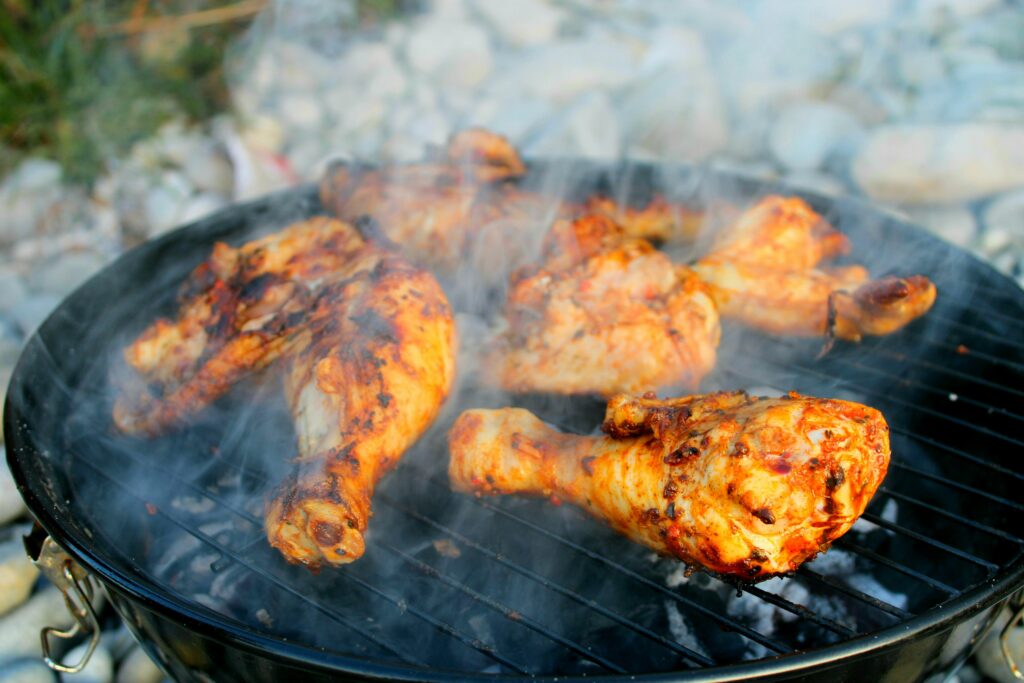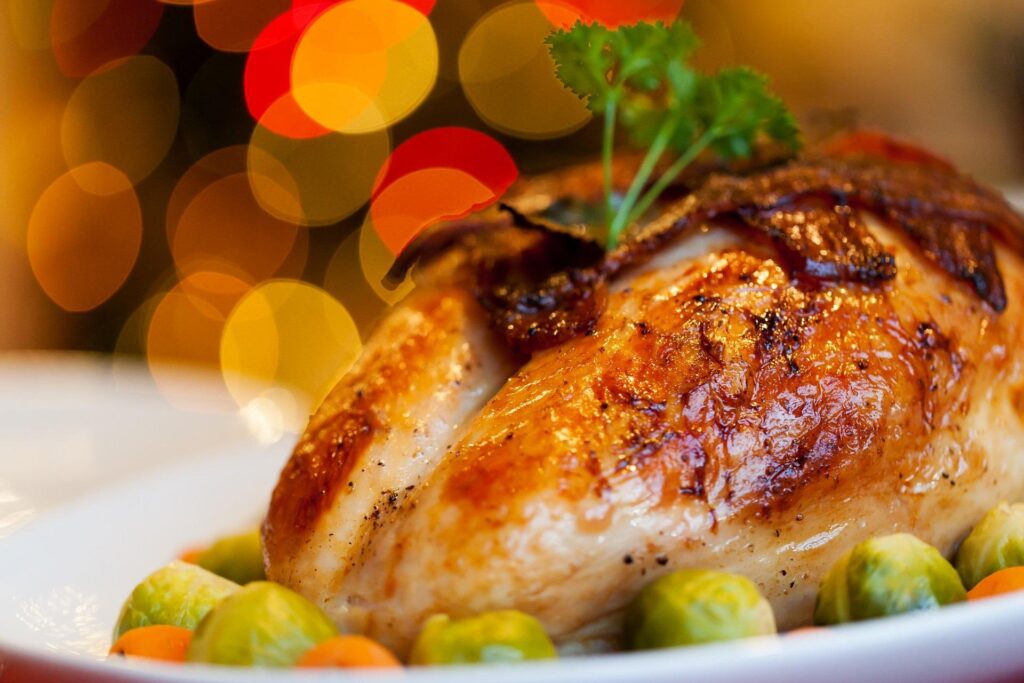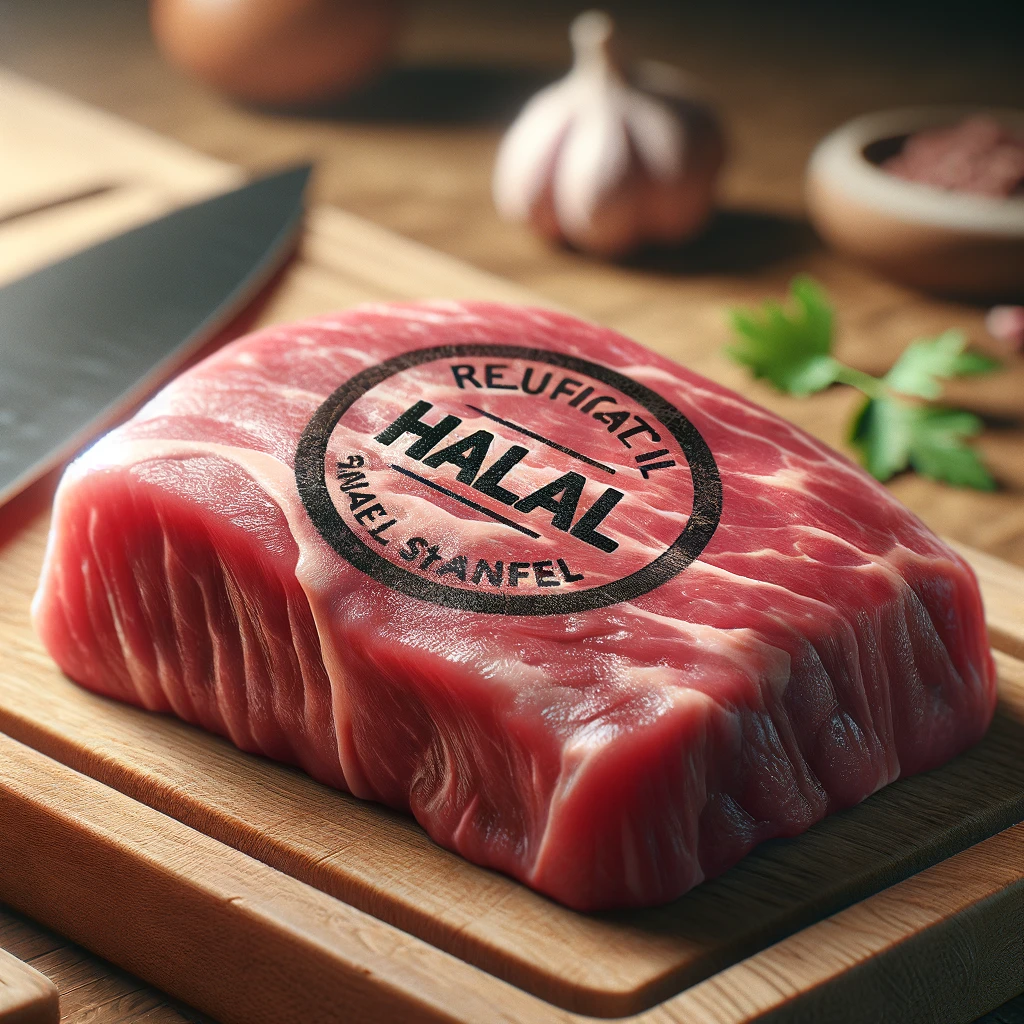Table of Contents
How Halal Meat is Prepared: Introduction
The term “halal” has gained considerable attention worldwide, transcending its religious origins to become a mark of quality and ethical preparation in the food industry. At the heart of Islamic dietary laws, halal meat is not only a dietary choice but a reflection of a lifestyle adhered to by millions around the globe. This blog aims to demystify the process of how halal meat is prepared, shedding light on its religious significance, the meticulous steps involved in its preparation, and the broader implications for health, culture, and the economy. By exploring the journey from farm to table, we aim to provide a comprehensive understanding of halal meat, making this concept accessible to both Muslims and non-Muslims alike.

Understanding Halal: An Overview
Halal, an Arabic word meaning “permissible” or “lawful,” encompasses more than just food and drink in the Islamic faith. It’s a term that guides the daily lives of Muslims, influencing their choices and behaviors to align with Islamic law. The concept of halal is deeply rooted in the Quran and Hadiths, providing Muslims a framework for living a life that is pleasing to Allah.
The Quran explicitly mentions what is permissible and what is forbidden to consume. For instance, pork and alcohol are strictly prohibited, while animals that are slaughtered in the name of Allah are considered halal. This practice is not only about dietary restrictions but also about ensuring the welfare of animals, cleanliness in processing, and ethical considerations in consumption.
The significance of halal in Islam cannot be overstated. It represents obedience to Divine commandments and a commitment to purity in all aspects of life. Eating halal meat is a form of worship, an act that brings Muslims closer to their faith by adhering to the prescribed dietary laws. This adherence fosters a sense of community and identity among Muslims, uniting them in their shared practices and beliefs.
Moreover, halal meat is believed to have numerous benefits. It is seen as healthier and purer due to the specific slaughtering and processing methods that reduce the risk of contamination and ensure the meat is clean and wholesome. This aspect of halal meat appeals not only to those following Islamic dietary laws but also to people looking for quality and ethically sourced food options.
How Halal Meat is Prepared: The Process
How halal meat is prepared is a process governed by Islamic law, designed to ensure the ethical treatment of animals and the purity of the meat consumed. This meticulous procedure is not just about the act of slaughter but encompasses the animal’s welfare from its rearing to the point it reaches the consumer. Here’s a detailed look at the steps involved in preparing halal meat:
Ethical Treatment and Welfare of Animals
In Islam, animals are to be treated with respect and kindness throughout their lives. This includes providing adequate space, proper nutrition, and a healthy environment that prevents suffering. The principles of halal emphasize the importance of compassion and prohibit any form of mistreatment or unnecessary harm to animals.

The Slaughtering Process
Intention (Niyyah)
The process begins with the intention or niyyah of the person performing the slaughter. This intention must be to undertake the act for Allah’s sake, adhering to the Islamic principles governing the slaughter.
Tasmiyah and Shahada
Before the slaughter, the name of Allah is invoked by saying “Bismillah” (In the name of Allah) and “Allahu Akbar” (Allah is the Greatest) to sanctify the act, making the meat lawful (halal) for consumption. This invocation is crucial as it signifies the acknowledgment of Allah’s provisions and blessings.
Swift and Humane Slaughter
The animal must be slaughtered with a sharp knife to ensure a quick and humane death, cutting through the jugular veins and carotid arteries, while leaving the spinal cord intact. This method is designed to reduce the animal’s suffering and allow for the rapid draining of blood from the body.
Post-Slaughter Requirements
Draining of Blood
Blood is considered impure in Islam, so it must be completely drained from the animal’s body. This not only complies with Islamic law but is also believed to make the meat cleaner and healthier.
Processing and Handling
After slaughter, the meat is processed in a way that maintains its purity and cleanliness. Halal certification bodies often inspect and monitor these processes to ensure compliance with halal standards.
Differences Between Halal and Non-Halal Slaughter Methods
The key distinctions between halal and non-halal slaughter include the invocation of Allah’s name, the method of slaughter, and the draining of blood. Unlike some non-halal practices, halal slaughter prohibits stunning the animal before slaughter, as it’s essential for the animal to be alive and healthy at the time of slaughter to be considered halal.
How halal meat is prepared is deeply rooted in Islamic ethics, emphasizing not just the physical aspects of slaughtering but the spiritual and ethical dimensions as well. This holistic approach ensures the dignity of the animal is respected, and the meat produced is wholesome and pure.
In addition to religious compliance, the method of how halal meat is prepared is appreciated for its attention to hygiene and animal welfare, aspects that resonate with contemporary concerns about food safety and ethical consumption. The process reflects a balanced harmony between adhering to religious obligations and ensuring the well-being of both animals and consumers.

Health and Nutritional Benefits of Halal Meat
The preparation of halal meat is not only a matter of religious compliance but also encompasses practices that have potential health and nutritional benefits. These benefits are attributed to the stringent requirements for animal welfare, the method of slaughter, and the subsequent handling of the meat. This section explores the scientific perspectives on the health implications of consuming halal meat and how it compares with non-halal meat in terms of nutrition and safety.
Hygiene and Safety
The halal slaughtering process emphasizes the importance of cleanliness and hygiene. The requirement for a swift and precise cut, the thorough draining of blood, and the prohibition of consuming dead animals (carrion) reduce the risk of contamination and bacterial growth. Blood, which can be a medium for bacteria, is fully drained, potentially lowering the likelihood of foodborne illnesses. These practices contribute to the overall safety and cleanliness of halal meat, making it a wholesome choice for consumers.
Animal Welfare and Stress Reduction
Halal principles mandate that animals be treated with respect and kindness, minimizing stress and discomfort. Animals that are less stressed produce meat that is of better quality, with studies suggesting that stress can affect meat texture, taste, and shelf life. The halal method, by focusing on the animal’s welfare, may contribute to meat that is not only ethically produced but also superior in quality.
Nutritional Content
While the method of slaughter primarily influences meat’s hygienic quality and ethical considerations, some research suggests that halal slaughtering practices could have an impact on the meat’s nutritional profile. The complete draining of blood may influence the meat’s texture and taste, although the effect on nutritional content is still a subject of ongoing research. The absence of blood, however, does ensure that the meat is fresher and potentially richer in taste.

Cultural and Economic Impact of Halal Meat
The halal meat industry extends beyond religious compliance, embedding itself deeply within cultural traditions and the global economic landscape. Its cultural significance and economic contributions are pivotal in understanding the broader implications of halal practices.
Cultural Significance
For Muslims, halal meat is not just a dietary requirement but a manifestation of their faith in daily life. It reinforces a sense of belonging and identity, connecting them to Islamic traditions and practices. This cultural significance is celebrated in various Muslim-majority countries through festivals, culinary traditions, and social gatherings, where halal food plays a central role. Moreover, the halal lifestyle has fostered a global community united by shared values and dietary habits, transcending geographical boundaries.
Economic Impact
The economic influence of the halal meat industry is profound, with the global halal food market continually expanding. This growth is driven by the increasing Muslim population, rising demand for halal products among non-Muslim consumers, and growing awareness of ethical and health considerations associated with halal meat. Countries are investing in halal certifications and infrastructure to tap into this lucrative market, contributing to job creation, international trade, and economic diversification. The halal food market has become a significant segment of the global economy, with halal meat being a key driver of this growth.
Globalization of Halal Meat
The demand for halal meat has led to its integration into the food industries of non-Muslim-majority countries, showcasing the globalization of halal practices. Supermarkets, restaurants, and food producers around the world are increasingly offering halal options, catering to the diverse preferences of their customers. This inclusivity not only promotes cultural exchange but also opens up new markets and opportunities for businesses, further propelling the economic significance of the halal meat industry.
Sustainability and Ethical Practices
The emphasis on animal welfare and ethical treatment in halal meat production resonates with contemporary concerns about sustainability and ethics in the food industry. This alignment has attracted a broader audience, including those interested in animal rights and environmental sustainability, contributing to the industry’s growth and diversification.
Challenges and Controversies
While the halal meat industry has seen significant growth and acceptance globally, it has not been without its challenges and controversies. These issues often stem from misunderstandings, ethical debates, and the complexities of implementing halal standards in diverse global contexts.
Misconceptions and Misinformation
Primary challenges facing the halal meat industry in how halal meat is prepared is the spread of misconceptions and misinformation. Some people mistakenly believe that halal slaughter is more cruel than other methods, not understanding the emphasis Islam places on compassion and minimizing the animal’s suffering. Education and transparency are crucial in addressing these misconceptions, highlighting the ethical considerations inherent in halal practices.
Ethical Debates Over Animal Welfare
The debate over animal welfare in the context of halal slaughter, particularly regarding pre-slaughter stunning, has sparked controversy. While some argue that stunning is more humane, others contend that the traditional halal method, when performed correctly, minimizes pain and stress. Ongoing research and dialogue between Islamic scholars, animal welfare activists, and the meat industry are vital to find common ground and ensure practices that are both religiously compliant and ethically sound.
Regulatory and Standardization Challenges
As the halal market expands globally, ensuring consistent standards and regulatory frameworks across countries becomes increasingly challenging. Differences in interpretation of Islamic law can lead to varying standards, complicating international trade and consumer trust in halal certifications. Efforts toward harmonization and mutual recognition of halal standards are essential to overcoming these obstacles and facilitating the industry’s growth.

How Halal Meat is Prepared: The Conclusion
In conclusion, how halal meat is prepared are a wide array of considerations — religious, ethical, health-related, and economic. This comprehensive exploration highlights the importance of understanding and respecting halal practices, fostering a global appreciation for a tradition that is central to the lives of millions around the world. As the industry evolves, it remains a testament to the enduring relevance of halal principles in contemporary society, inviting ongoing dialogue and learning about this integral aspect of Islamic culture.
FAQs for How Halal Meat is Prepared
What does “halal” mean?
Halal is an Arabic word that means “permissible.” In the context of food, it refers to items that are allowed for consumption according to Islamic guidelines.
Is halal meat healthier than non-halal meat?
While individual preferences may vary, halal meat generally has a lower fat content due to the blood drainage process. Additionally, the emphasis on cleanliness and hygiene during the preparation process can contribute to a healthier product.
Do I have to be Muslim to eat halal meat?
No, anyone can consume halal meat. Many non-Muslims choose to eat halal meat due to its health benefits and ethical treatment of animals.
What is the difference between halal and kosher meat?
Both halal and kosher meat preparation follow religious guidelines, with halal adhering to Islamic principles and kosher adhering to Jewish laws. While there are similarities, such as blood drainage and humane slaughter, there are also differences, including the type of animals that can be consumed and the specific slaughtering process.
Where can I buy halal meat?
Halal meat is widely available at specialized halal butchers, grocery stores, and supermarkets. Always look for a halal certification label to ensure the meat has been prepared according to Islamic guidelines.


Pingback: Is Porn Haram in Islam? A Religious Perspective - Simply Islamic
Pingback: Life Insurance is Haram: Understanding the Ethical and Religious Implications - Simply Islamic
Pingback: Foods That Are Haram: Unveiling The Forbidden Culprits Damaging Your Spiritual Wellness
Pingback: 6 Kalimahs In Islam: Strengthen Your Faith & Understanding